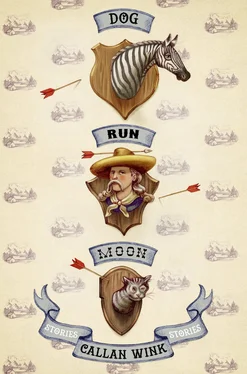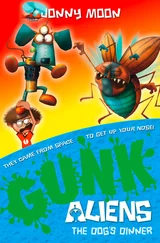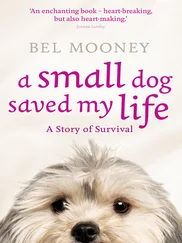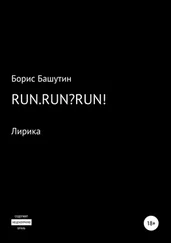The floor was carpeted with twisted feline forms, tabbies, calicos, some night black, some pure white, intermingled and lumpy and irrevocably dead. They lay like pieces of dirty laundry where they’d fallen from their perches after the tainted milk had taken its hold on their guts. August coughed and spit, slightly awed, thinking about last night, and the way the antifreeze had turned the bluish white milk a sickly rotten green. He nudged a few of the still forms with his boot and looked to the rafters and found them empty except for one, where he spotted a calico, its dead claws stuck in the joist so it dangled there, like a shabby, moth-eaten piñata.
He pulled his shirt cuffs into his gloves against the fleas jumping everywhere, and began pitching the cats down the hay chute. As he worked the voice of Paul Harvey found its way up from the radio on the ground floor.
There’s going to be unrest. There’s always going to be unrest but things always get better. Tomorrow will always be better. Just think about it, is there any time in history in which you’d rather live than now? I’ll leave you with that thought. I’m Paul Harvey, and now you know the rest of the story.
August climbed down the ladder and stepped shin deep into a pile of cats. He got out his jackknife and stropped it a few times against the side of his boot and set to work separating the cats from their tails. He pushed the cats into the conveyor trough as he worked and when he was done he flipped the wall switch to set the belt moving. August watched the cats ride the conveyor until all of them went out of sight under the back wall of the barn. Outside, they were falling from the track to the cart on the back of the manure spreader. He didn’t go out to look but he imagined them piling up, covering the dirty straw and cow slop, a stack of forms as lifeless and soft as old fruit, furred with mold. Tomorrow or the next day his father would hook the cart up to the tractor and drive it to the back pasture to spread its strange load across the cow-pocked grass.
—
It took him a long time to nail the tails to the board and as he pounded the last one they were already stiffening. The sky was just starting to take on the milky light of predawn when August carried the board up to the new house. In the mudroom he stopped and listened. There was no sound of his father and Lisa in the kitchen but he knew they’d be up soon. He leaned his board against the coatrack, directly over his father’s barn boots, and regarded his work as it was, totem and trophy, altogether alien against a backdrop of lilac-patterned wallpaper.
August tried to whistle as he walked across the lawn and down the hill to the old house. He’d never gotten the hang of whistling. The best he could muster was a spit-laced warble. On the porch he wiped at his lips with the back of his sleeve and looked in the window. His mother was at the kitchen table. She held a card in her hand, raised, as if she were deciding her next move but August could see that the cards in front of her were scattered across the table in disarray, a jumbled mess, as if they’d been thrown there.
On the last day of class before summer vacation, his students — all fifteen of them, ranging in age from eight to sixteen — filed out the door saying their goodbyes. Before leaving, one of his sixth graders, Molly Hanchet, stopped at his desk. She had red hair and freckles and, in five years, would likely be Park County’s Fourth of July rodeo queen. After that, she would go on to premed at Stanford. She had her thumbs hooked in the straps of her backpack and she said, “Have a good summer, Mr. Colson. I hope next year you feel better.”
She left, and James was forced to ponder the implications. It had to be bad if a sixth-grade girl could see that he was fucked.
—
Carina lived in a small rental cabin on the river, set back in a grove of old cottonwoods. Once, in a windstorm, he’d lain awake, envisioning whole trees shearing off at rotten points in their trunks, branches punching through the roof, flattening him and Carina in the bed. He imagined them being found out that way.
Carina wasn’t home and he sat on her front step. He was preparing to leave when her car pulled in behind him. She got out and groaned at the sight of him. “I’ve had a bad day,” she said, “I don’t know if I can handle you right now.”
“Maybe I’ve come here to profess my undying love.”
She snorted.
They did it with her bent over the small two-burner stove, her skirt up around her waist. In their frantic movements, one of them nudged a burner switch and soon the cabin was full of a strange odor. James thought for a moment that he was having some sort of olfactory response to imminent ejaculation. And then Carina was slapping him and swearing. A section of her hair had begun to curl and smoke.
—
He sat at the foot of the bed facing her. She was on her back inspecting the ends of her hair.
“God,” she said, “what a day.”
“She’s moving her stuff out right now. That’s partly why I’m here. I can’t really go home for a while. I drove by the house, and she was loading boxes.”
Carina didn’t say anything. She wet her fingertips in her mouth and rubbed at a burnt end.
“Boxes. Moving, dying, breaking up. All life’s great tragedies are marked by the appearance of those goddamn square cardboard units. Such an ominous shade of brown.” He’d thought of this earlier today, and now it pleased him to say it. He wished she’d come to his side of the bed and put her hand on his leg. He didn’t think that was asking too much.
“Fuck,” Carina said. “I may have to get a haircut to fix this.”
“Part of me didn’t actually believe that she was going to leave. We had some serious work-it-out talks. We went camping up on the Stillwater last weekend. We sat side by side next to the campfire. She said the stars above were like a million diamonds . She said that. I almost asked her to marry me.”
Carina was pressing her hands to her face. Her fingernails, as always, were immaculate, painted a brilliant red. Each nail was like a little cherry hard candy that James wanted to crush between his teeth.
“I’m serious,” he said. “I was going to propose. And you know what? Why can’t the stars above be like a million diamonds? And why, when she said that, did I want to tell you about it immediately?” James stopped. There was some sort of noise emerging from behind Carina’s hands, both of which were now clamped over her mouth. Her fingernails were digging into her cheeks and her eyes were screwed shut. And then she rose from the bed and he could hear her retching in the bathroom.
When she emerged, her dark hair was in beautiful disarray. She was brushing her teeth, one arm crossed over her bare breasts.
—
Carina had come from San Francisco on a grant to teach creative writing to at-risk girls on the Crow Reservation. She was writing a book about her experiences. For someone who could be so sarcastic, downright caustic, it surprised James to see the level of earnestness with which she approached her job. She loved it. She loved the at-risk girls — a classification that, on the reservation, seemed synonymous with the general population. She approached each class day with happy anticipation. If he happened to entertain the idea of staying over on a school night, she would kick him out so she could prepare. She was a teacher and he was a teacher, but what she did was something completely different. He fully acknowledged that. She had a passion. He enjoyed the really nice sense of calm that came from having good health benefits.
She sometimes read him sections of stories or poems, written by her girls. James had to admit that some of the stuff was pretty remarkable. There was one he always remembered, the words themselves and the way Carina had read it, in bed, naked, on her stomach with her feet up in the air, her heels knocking together in time with the words. I look at him, the boy that doesn’t love me, and it’s like a badger has climbed into my chest. The badger tramples my stomach while it chews on my heart.
Читать дальше












